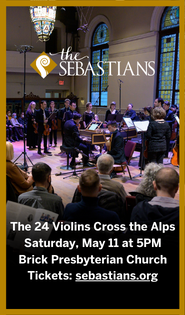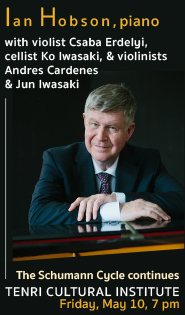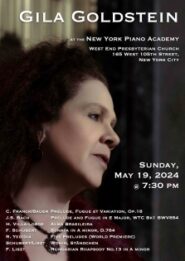Pianist Shpachenko brings strength to wide range of living composers
For a venue that proprietor Glenn Cornett likes to describe as “too small to fail,” Spectrum books a disproportionate number of fine musicians playing smartly designed programs.
The latest example was pianist Nadia Shpachenko, nominated for a Grammy for her CD Woman at the New Piano: American Music of 2013. Coming in from Southern California, she brought a program of nine different pieces, “Quotations and Homages,” all of recent vintage, including six world premieres Sunday night.
The works are responses to music of composers of the past. Despite the conceptual framework, the music covered a broad range of styles—almost entirely tonal. Shpachenko herself is a strong player, with a touch that gives weight and solidity even at low dynamics.
Some of the pieces put a premium on the piano’s percussive qualities, and Shpachenko seemed to relish those the most. Vera Ivanova’s 6 Fugitive Memories—a world premiere—alludes to Prokofiev via the title and through musical quotation in the second of the six miniature movements, but the opening “Composition No. 1” immediately recalls the ominous tread of Galina Ustvolskaya. Ivanova’s memories go from there to the far aesthetic shores of Morton Feldman, and there is a delicate movement that responds to Kurtág, with a beater to play the piano strings like a cimbalom. The concluding mashup of Debussy and Satie, “Debutie,” showed more rough edges than one would expect, to the music’s advantage.
Michael Vincent Waller is a composer whose work is at the contemporary end of both Satie and Debussy, and the premiere of his Visage VII – Inside World was next. Waller consistently makes interesting and unusual work of the tools of minimalism, as in this fine new piece. Over a rising bass ostinato, Shpachenko gracefully played a long-limbed melody that sounded more attractive with each note. Waller pointed to the influence of Liszt’s transcription of Otto Nicolai’s Ein fest Burg is Unser Gott, Op. 31, but Waller’s own way of fitting an expressive, improvisatory line into strict rhythm is unusual on the current scene, and Inside World uses simplicity to describe compelling depths.
More direct, and in a way more personal, was Daniel Felsenfeld’s punchy Down to You is Up, premiered in a newly revised version. The piece is three movements “going into battle with the Velvet Underground,” says the composer. Some of it rewrites the originals, some of it writes over the originals. A bit of “All Tomorrow’s Parties” shows up as a bass line in “Good Times Just Seem to Pass Me By,” but the Velvet influence mainly come through in the meaty passion of the music. It gets wild at times, and Shpachenko played with plenty of power.
Some of the loveliest moments of the evening came from Peter Yates’ Epitaphs and Youngsters, for speaking pianist with accompanying slide show. This was another premiere, in five short movements that dismantle bits of Ives, Ravel, Bach, de Falla, and Gershwin, and short spoken passages from Robert Louis Stevenson, Glenn Gould, John Muir, Oscar Wilde, and W.C. Fields. The visual component mixed charming paintings by Shpachenko’s young son and images of the writers, and though no single component was outstanding, the mix of media was refreshing and satisfying.
The world premiere of Matthew Elgart’s Omaggio, music that responds to Bach and Ravel, was less successful. The music hesitates to follow through any one idea—several canons are begun and abandoned—and in general has a haphazard organization that even the pianist’s commitment could not bring together.
Following Omaggio was another premiere, and the highlight of the concert, Tom Flaherty’s Rainbow Tangle for piano with electronics. Flaherty based the piece on the cello solo from the seventh movement of Messiaen’s Quartet for the End of Time. The piece is relatively simple and notably smart, extracting pared-down versions of the solo line and harmonies from the original, then processing the piano through a delay. At times the electronics produce a propulsive, rhythmic repeat, at others a massive wall of sound that evoked the unique quality of Messiaen’s chords. Shpachenko played expertly with and through the electronics, shaping the dynamics into a rich ambient sound.
After Nick Norton’s Piano Piece for Mr. Carter’s 100th Birthday–a statement of a 12-note chromatic scale—came Missy Mazzoli’s Bolts of Loving Thunder. Mazzoli wrote the music after a request from Emanuel Ax to write a piece inspired by Brahms. She gave him, and now Shpachenko, an exhausting set of cross-hand runs up and down the keyboard. The piece alludes to some of the exciting physicality of Brahms, but the one-dimensional approach has none of his teeming interior life nor wistful romanticism. Still, Shpachenko’s impressive pianism carried the music.
The finale was unfortunate, better suited for an encore. Accidental Mozart, by Adam Borecki, is essentially the answer to the question, what if a drunk pianist plays Mozart’s Piano Sonata K. 545? The answer, strangely, is that after modulating to the minor and the diminished, the pianist breaks into a bit of Peer Gynt. This musical juvenilia was exacerbated by a sophomoric slide show of alcoholic beverages, all with something about Mozart in the name.
That final misstep was nothing a good, stiff drink couldn’t wash away, leaving the impression of an eminently worthwhile concert from Shpachenko and her fellow composers.
Nadia Shpachenko plays at Bargemusic’s Here and Now Series, June 24. bargemusic.org.








Posted Dec 15, 2015 at 8:20 pm by Sharif Awan
Nicely written review and well thought out. Nadia deserves it. Cheers!